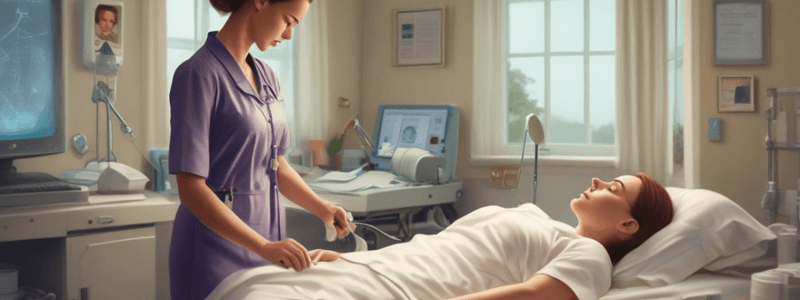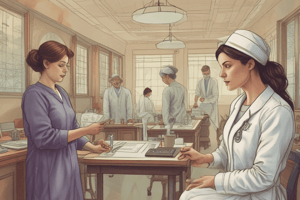Podcast
Questions and Answers
What is the primary goal of critical thinking in nursing?
What is the primary goal of critical thinking in nursing?
To process thoughts to determine an ideal outcome
What is the nurse's role in determining an appropriate outcome through critical thinking?
What is the nurse's role in determining an appropriate outcome through critical thinking?
To discern between factual statements, opinions, and judgment
What is the significance of critical thinking in the nursing profession?
What is the significance of critical thinking in the nursing profession?
To achieve an ideal outcome
According to the Clinical Judgment Model, what is the first step in critical thinking?
According to the Clinical Judgment Model, what is the first step in critical thinking?
How does critical thinking influence clinical reasoning in nursing?
How does critical thinking influence clinical reasoning in nursing?
What is the relationship between critical thinking and clinical judgment in nursing?
What is the relationship between critical thinking and clinical judgment in nursing?
What is the outcome of effective critical thinking in nursing practice?
What is the outcome of effective critical thinking in nursing practice?
How does critical thinking contribute to the development of a Christian nurse servant?
How does critical thinking contribute to the development of a Christian nurse servant?
What type of thinking is required when a nurse needs to consider the results of their actions based on their skill set, experience, and learned knowledge?
What type of thinking is required when a nurse needs to consider the results of their actions based on their skill set, experience, and learned knowledge?
What characteristic of critical thinking enables a nurse to adapt to the changing needs of a client?
What characteristic of critical thinking enables a nurse to adapt to the changing needs of a client?
What is the primary goal of cultivating self-awareness in nursing practice?
What is the primary goal of cultivating self-awareness in nursing practice?
How can a nurse cultivate curiosity in their practice?
How can a nurse cultivate curiosity in their practice?
What is the purpose of reflecting on past conflicts in a nursing journal?
What is the purpose of reflecting on past conflicts in a nursing journal?
What is the relationship between critical thinking and rapid changes in client care?
What is the relationship between critical thinking and rapid changes in client care?
What is the significance of seeking feedback from management and trusted sources in cultivating self-awareness?
What is the significance of seeking feedback from management and trusted sources in cultivating self-awareness?
What is the ultimate goal of developing critical thinking and reflective practice in nursing?
What is the ultimate goal of developing critical thinking and reflective practice in nursing?
What is the key to being alert to context, and how can nurses improve this ability?
What is the key to being alert to context, and how can nurses improve this ability?
What are the benefits of becoming more reflective in nursing practice?
What are the benefits of becoming more reflective in nursing practice?
How can journaling help nurses improve their reflective and self-corrective skills?
How can journaling help nurses improve their reflective and self-corrective skills?
What does it mean to be confident and resilient in nursing, and how can nurses develop these skills?
What does it mean to be confident and resilient in nursing, and how can nurses develop these skills?
What role does active listening play in being alert to context, and how can nurses improve their active listening skills?
What role does active listening play in being alert to context, and how can nurses improve their active listening skills?
How can seeking help from others, such as family members, close friends, or professionals, contribute to improved reflection and self-correction in nursing?
How can seeking help from others, such as family members, close friends, or professionals, contribute to improved reflection and self-correction in nursing?
What is the importance of maintaining a set time to intentionally reflect in nursing practice?
What is the importance of maintaining a set time to intentionally reflect in nursing practice?
How can being reflective and self-corrective contribute to improved decision making in nursing practice?
How can being reflective and self-corrective contribute to improved decision making in nursing practice?
What are the ways to build resilience in nursing?
What are the ways to build resilience in nursing?
What is the difference between inductive and deductive reasoning?
What is the difference between inductive and deductive reasoning?
How does the nursing process parallel the problem-solving process?
How does the nursing process parallel the problem-solving process?
What is the definition of clinical judgment in nursing?
What is the definition of clinical judgment in nursing?
What is an example of inductive reasoning in nursing practice?
What is an example of inductive reasoning in nursing practice?
What is the purpose of the assessment phase in the nursing process?
What is the purpose of the assessment phase in the nursing process?
What is the role of critical thinking in clinical judgment?
What is the role of critical thinking in clinical judgment?
How can nurses develop their problem-solving skills?
How can nurses develop their problem-solving skills?
What is the primary difference between a nursing diagnosis and a medical diagnosis?
What is the primary difference between a nursing diagnosis and a medical diagnosis?
What is the purpose of a diagnostic statement in a nursing diagnosis?
What is the purpose of a diagnostic statement in a nursing diagnosis?
What is the role of etiology in a nursing diagnosis?
What is the role of etiology in a nursing diagnosis?
What are the four components of a nursing diagnosis?
What are the four components of a nursing diagnosis?
What is the purpose of a 'related to' statement in a nursing diagnosis?
What is the purpose of a 'related to' statement in a nursing diagnosis?
What is the difference between a client cue cluster and a nursing diagnosis?
What is the difference between a client cue cluster and a nursing diagnosis?
What is the functional health pattern that incorporates hydration?
What is the functional health pattern that incorporates hydration?
What is the role of inferences in a nursing diagnosis?
What is the role of inferences in a nursing diagnosis?
Flashcards are hidden until you start studying




